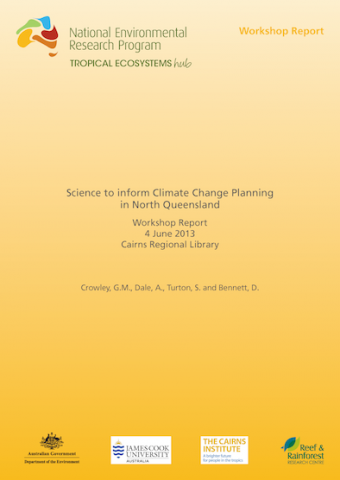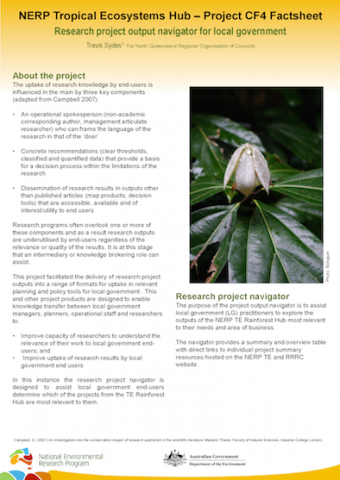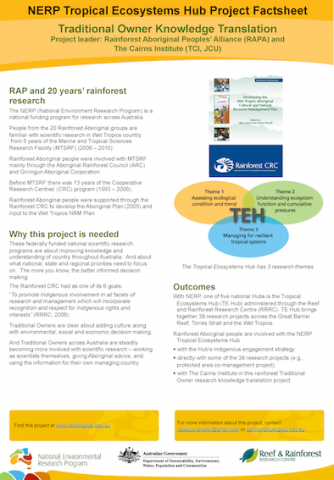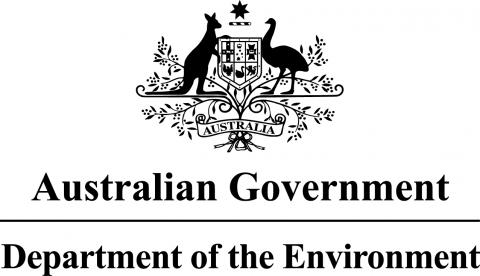Resources


Crowley, G.M., Dale, A., Turton, S., Bennett, D. (2013) Science to inform Climate Change Planning in North Queensland.
© The Cairns Institute, James Cook University

 Sydes, T. (2014) Research project output navigator for local government.
Sydes, T. (2014) Research project output navigator for local government.


RAP and 20 years’ rainforest research
The NERP (National Environment Research Program) is a national funding program for research across Australia. People from the 20 Rainforest Aboriginal groups are familiar with scientific research in Wet Tropics country from 5 years of the Marine and Tropical Sciences Research Facility (MTSRF) (2006 – 2010). Rainforest Aboriginal people were involved with MTSRF mainly through the Aboriginal Rainforest Council (ARC) and Girringun Aboriginal Corporation. Before MTSRF there was 13 years of the Cooperative Research Centres’ (CRC) program (1993 – 2006). Rainforest Aboriginal people were supported through the Rainforest CRC to develop the Aboriginal Plan (2005) and input to the Wet Tropics NRM Plan.
News.com.au
30 July 2013
SCIENTISTS have developed a new super sunscreen that mimics the way Great Barrier Reef corals protect themselves from UV light.
CSIRO scientists have spent the past two years harnessing the way the reefs' corals have survived Queensland's harsh sun for million of years in shallow waters. Read more

ABC News
17 September 2013
The Queensland Government will wait before beginning an expensive proposal to fix a turtle rookery at Raine Island off Cape York until it assesses the impacts of a new trial.
Queensland Environment Minister Andrew Powell says they were considering shipping sand to the remote island, which has suffered a dramatic decline in hatchling success rates due to a gradual loss of viable nesting areas. Read more

ABC News
20 November 2013
The Queensland Government has announced the Steve Irwin Wildlife Reserve and the Wenlock River in Cape York will be protected from open-cut and strip mining.
The area is the first to be named a "strategic environmental area" under the Regional Planning Interests Bill to go before Parliament today. Read more

ABC News
04 June 2013
The first scientific project designed to capture the underwater sounds of the Great Barrier Reef off Queensland has begun.
Queensland researchers are hoping to determine whether human activities such as shipping impacts on communication between marine animals. Read more

Dredging Today
17 January 2014
Queensland’s peak resources sector body said it remains confident that the Great Barrier Reef Marine Park Authority will continue to base its decision-making on the best available science.
Queensland Resources Council Chief Executive Michael Roche said today that as a result of an expensive but transparently deceptive campaign by environmental activists to demonise port developments, there was growing confusion over real and present dangers to the park’s long-term health. Read more

NERC Science of the Environment
15 November 2013
When tropical forests are cleared, they can take a century or more to re-absorb the carbon they once held, according to a new study. But their biodiversity is even slower to recover, and some species may never return.
Forests absorb carbon from the atmosphere as they grow, but when they are cleared this returns to the atmosphere, contributing to climate change. More than half the world's tropical rainforest has now been cleared for agriculture, logged or burned, so it's important to know how long it takes for so-called 'secondary forests' to absorb a similar amount of carbon again once they are allowed to grow back. Read more

The University of Queensland
05 May 2014
The discovery of musky rat-kangaroo fossils has prompted experts to call for better protection of tropical rainforests after new links show the tiny marsupial cannot survive outside that environment.
The findings come from a study by The University of Queensland and The University of New South Wales. Read more



